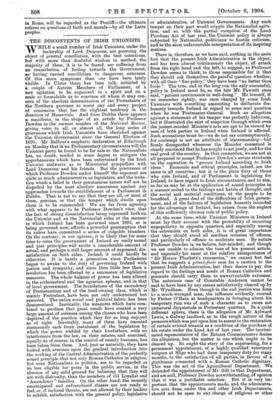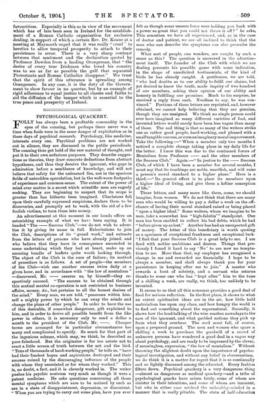THE DISCONTENTS OF IRISH UNIONISTS.
WHILE a small number of Irish Unionists, under the leadership of Lord Dunraven, are pursuing the object of general conciliation, with the best intentions, but with more than doubtful wisdom in method, the majority of them, it is to be feared, are suffering from an exacerbation of feeling towards the Government, as having carried conciliation to dangerous extremes. Of this more symptoms than one have been lately 'visible. In Ulster there has been talk, initiated by a couple of Antrim Members of Parliament, of a new agitation to be organised in a spirit and on a scale so formidable as to convince all whom it may con- cern of the absolute determination of the Protestants of the Northern province to resist any and every project of concession that has the slightest tendency in the direction of Home-rule. And from Dublin there appears a manifesto, in the shape of an article by Professor Dowden in the current number of the National _Review, giving voice to all, or almost all, the long series of grievances which Irish Unionists have cherished against the Unionist Government since the General Election of 1895. Mr. Balfour's emphatic declaration at Edinburgh on Monday that in no Parliamentary circumstances will the Unionist party be found to be for sale to the Nationalists has, no doubt, tended in some degree to mitigate the apprehensions which have been entertained by the Irish Unionist stalwarts as to Ministerial sympathies with Lord Dunraven and his friends. But the grievances of which Professor Dowden makes himself the exponent are quite as much administrative as legislative, and the irrita- tion which a belief in their genuineness causes will not be dispelled by the most absolute assurances against any approaches towards the establishment of a Parliament in Dublin. That is not to say that they are all, or most of them, genuine, or that the temper which dwells upon them is to be commended. We are far from agreeing with what appears to be Professor Dowden's view, that the fact of strong dissatisfaction being expressed both on the Unionist and on the Nationalist sides at the manner in which Ireland has been governed since 1895, or is being governed now, affords a powerful presumption that its rulers have committed a series of culpable blunders. On the contrary, in our opinion, it is likely that for some time to come the government of Ireland on really sound and just principles will excite a considerable amount of actual, and perhaps a still larger amount of expressed, dis- satisfaction on both sides. Indeed, it could hardly be otherwise. It is barely a generation since Parliament began to awake to the duty of governing Ireland with justice and sympathy, and since then little less than a revolution has been effected by a succession of legislative measures. The whole balance of power has been altered in the ecclesiastical and the agrarian spheres, and in that of local government. The foundations of the ascendency of Protestantism and of the land-owning class, which is mainly Protestant, have been not only undermined but removed. The entire social and political fabric has been democratised. Inevitably, the measures which have com- bined to produce that great result have created a very large amount of soreness among the classes who have been deprived of the position which they for so long enjoyed as of right. Inevitably, many of them have resented strenuously each fresh instalment of the legislation by which the power wielded by their forefathers, with no interference from the law, on their estates, and exercised, equally as of course, in the control of county business, has been taken from them. And, just as naturally, they have looked with aversion upon the gradual introduction into the working of the Central Administration of the perfectly sound principle that not only Roman Catholics in religion, but even Nationalists in politics, are to be regarded as no less eligible for posts in the public service, in the absence of any solid ground for believing that they will act with disloyalty, than the members of old Loyalist and "Ascendency" families. On the other hand, the recently emancipated and enfranchised classes are not ready to feel, or, if inclined thereto, are not allowed by their leaders to exhibit, satisfaction with the general policy, legislative or administrative, of Unionist Governments. Any such temper on their part would cripple the Nationalist agita- tion, and so, with the partial exception of the Land Purchase Act of last year, the Unionist policy is always subjected by Nationalist politicians to hostile criticism, and to the most unfavourable interpretation of its inspiring motives.
There is, therefore, as we have said, nothing in the mere fact that the present Irish Administration is the object, and has been almost continuously the object, of attack from the right hand and the left, to suggest, as Professor Dowden seems to think, to those responsible for it that they should ask themselves the painful question whether, with all their "fine policy," they have been "no better than fools." The true, and in the long run the only successful, policy in Ireland must be, as the late Mr. Fawcett once said, "patient continuance in well-doing." He himself, if we remember rightly, was once charged by some Irish Unionists with something amounting to deliberate dis- honesty towards Ireland in regard to some mail question when he was Postmaster-General. Such an allegation against a statesman of his temper was perfectly ludicrous, but it illustrated the mist of suspicion through which even the justest-minded. Minister's acts are apt to be viewed by men of both parties in Ireland when Ireland is affected. Such accusations must be—we do not say contemptuously, for contempt is not an attribute of statesmanship—but firmly disregarded whenever the Minister concerned is clearly convinced that he has sought to act justly, and for the real good of the country. In that connection, we are not at all prepared to accept Professor Dowden's severe strictures on the aspiration to "govern Ireland according to Irish ideas." Economic and ethical principles, indeed, are the same in all countries ; but it is the plain duty of those who rule Ireland, and of Parliament in legislating for Ireland, to have regard to Irish circumstances, and to aim, as far as may be, at the application of sound principles in a manner suited to the feelings and habits of thought, and the social and material conditions, of the people to be benefited. A great deal of the difficulties of Irish govern- ment, and of the failures of legislation honestly intended for the advantage of Ireland, has arisen from the neglect of this sufficiently obvious rule of public policy.
At the same time, while Unionist Ministers in Ireland must lay their account with the probability of incurring unpopularity in opposite quarters, and especially among the extremists on both sides, it is of great importance that they should avoid all needless occasion of offence, and. particularly of offence to moderate men. By nature Professor Dowden is, we believe, fair-minded ; and though we are unable to admire the tone of his present article, and especially his sneer at the relative unimportance of "Sir Horace Plunkett's creameries," we cannot but feel that he suggests a prima -facie case for a caution to the present Irish Administration, lest their desire to pay due regard to the feelings and needs of Roman Catholics and peasants should carry them to unwarrantable extremes. The notorious case of Constable Anderson cannot be said to have been by any means satisfactorily cleared up by Mr. Wyndham. Even though in the end justice was done to a much-wronged man, the influence evidently exerted by Father O'Hara at headquarters in bringing about his temporary ruin was of such a character as to cause not unnatural disquietude in Protestant quarters. In a quite different sphere, there is the allegation of Mr. Aylward Lewis, a Galway landlord, as to the rough nature of the pressure which was put upon him to assent to the restoration of certain evicted tenants as a condition of the purchase of his estate under the Land Act of last year. The incrimi- nated representative of the Estates Commissioners denies the allegation, but the matter is one which ought to be cleared. up. So ought the story of the superseding, for a permanent appointment, of a highly qualified veterinary surgeon at Sligo who had done temporary duty for many months, to the satisfaction of all parties, in favour of a gentleman connected with a Roman Catholic dignitary. This was the act of the Agricultural Department. We defended the appointment of Mr. Gill to that Department, and are still, Professor Dowden notwithstanding, of opinion that it was a justifiable selection. But it is very im- portant that the appointments made, and the administra- tive acts done, under this and other Irish Departments, should not be open to any charge of religious or other
favouritism. Especially is this so in view of the movement which has of late been seen in Ireland for the establish- ment of a Roman Catholic organisation for exclusive dealing, in support of which a certain Rev. Dr. Keane at a meeting at Maynooth urged that it was really " cruel " to heretics to allow temporal prosperity to attach to their persistence in error. There is a very sharp contrast between that sentiment and the declaration quoted by Professor Bowden from a leading Orangeman, that "the desire of every true Irishman who loved his country was to see as far as possible the gulf that separated Protestants and Roman Catholics disappear." We trust that the spirit of this utterance is spreading among Orangemen. In any case, it is the duty of the Govern- ment to show favour in no quarter, but by an example of rigid adherence to equal justice to all classes and faiths to aid the diffusion of the temper which is essential to the true peace and prosperity of Ireland.











































 Previous page
Previous page